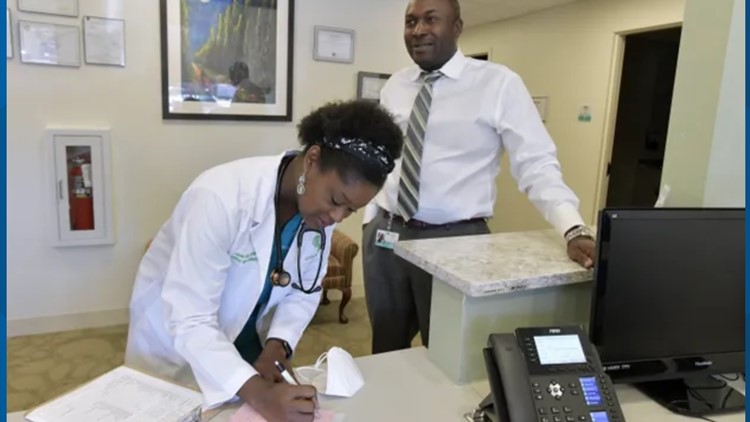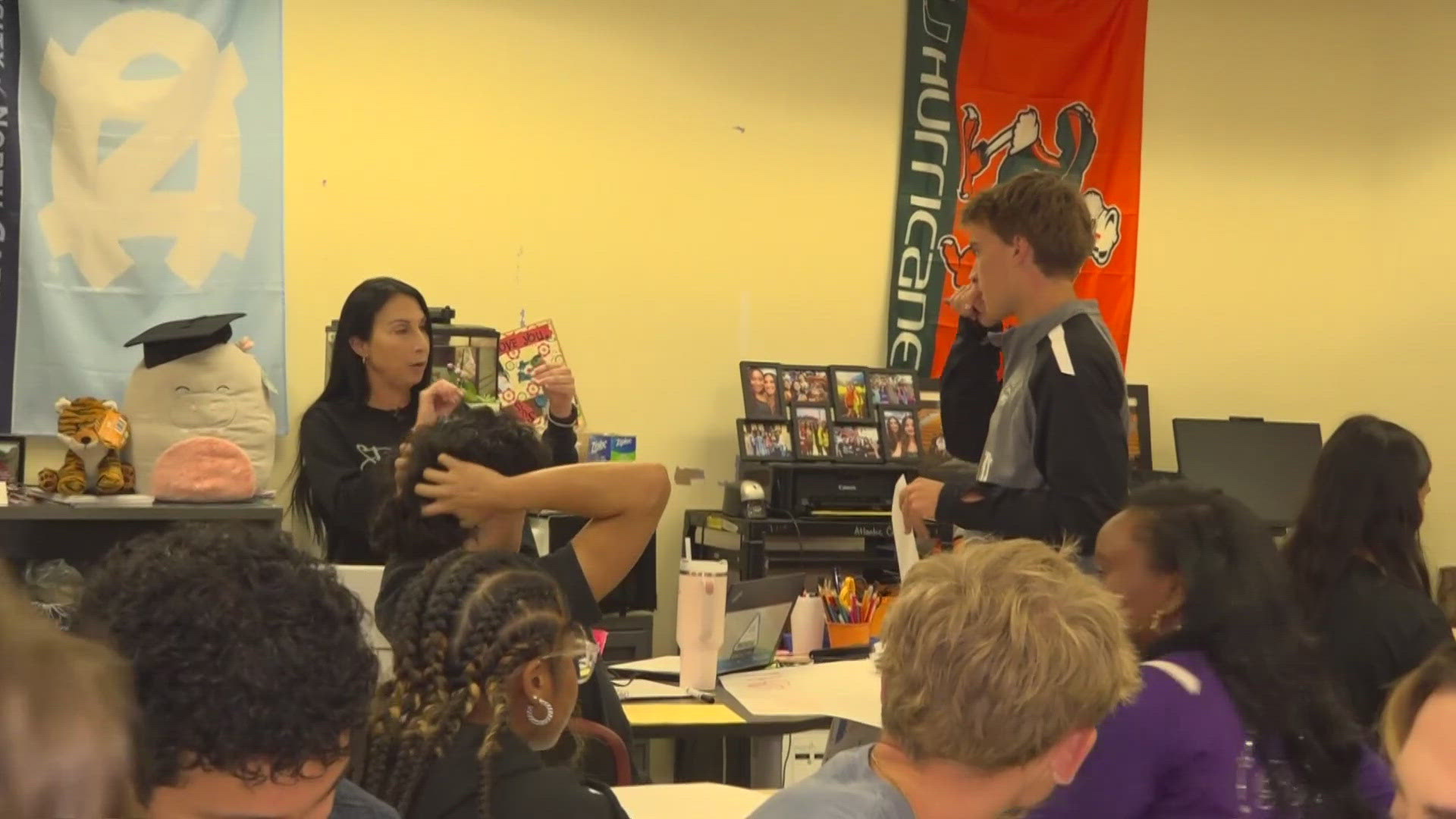JACKSONVILLE, Fla. — Jacqueline Fletcher wanted a primary care practitioner who took the time to listen to her, hear her, make her feel safe. She wanted someone who understood her ongoing life experience as a Black woman.
She said she found exactly that in Jamie Neal, an advanced registered nurse practitioner and certified midwife who recently opened Life Tree Women Care on Jacksonville's Westside with her CEO husband Derek Neal. They call the clinic the only one of its kind — Black-owned and -operated, with the lead provider someone of Jamie Neal's particular training — in Northeast Florida.
"That's the reason I went there, because they were African-American," Fletcher said. "It means a lot to me. One of the main things was she seemed to really care and really listen to what I say. She was very attentive, not rushing."
Before Fletcher, 62, even left the building after her first patient visit, she had decided to transfer her medical care to Life Tree.
"It was like she could identify with my struggles," she said. "I'm telling you, girl, I signed those papers."
The foundation of the practice is a concept called cultural competence, which Jamie Neal, 43, said requires medical providers to "put biases to the side, listen to people needing care, listen to what they need and use that information."
The provider, she said, must pay attention not only to the medical ills that prompted the patient's visit but to the whole person.
"Health care clinics are so busy. There are many more patients that need care than there are providers," Neal said. Many practices become "numbers- and outcome-driven," leaving some patients feeling inadequately served, she said.
"I'm just doing what I want to do," she said. "I talk to them and listen to them, make them feel important."
The clinic welcomes all women, but so far all her patients are Black.
"They seek me out," Neal said, "because I look like them."
Practice can be a model for others
She is a wife, mother, former Navy corpsman and retired Naval Reserve. She has overcome a lack of confidence dating back to her childhood that, for a time, stopped her medical training in its tracks. She fought through post-partum depression. She and Derek Neal, 44, survived the late 2000s recession that cratered his real estate business.
And as a Black woman, she has experienced the kind of struggles that made her understand Fletcher's desire to have a provider of her own race. She also understood that there is racial disparity in health care, with higher rates for death and chronic illness for minorities, and wants to be part of the solution.
"That's the main thing that made me want to do this," she said. "We are here to take care of all women … It [the disparity] doesn't seem fair, doesn't seem right. I have been a victim of that. I have seen it firsthand."
Longtime friend Lakia O'Neal said the couple are the kind of people who "would give you the shirt off their backs." She was not surprised that the Neals, who once ran a nonprofit youth sports organization, were building a health care business to improve lives.
"They are all about the community, helping people," she said. "You need more people like Jamie and Derek in your life."
In addition to fighting bias and disparity in the practice, the Neals spread the word in their social lives. They go on outings with couples in the profession and talk with them about those issues, Derek Neal said.
"They say, 'I've never looked at it this way,'" he said. "They don't even realize."
Kimberly Allen is CEO of 904WARD, a community organization formed six years ago to advance racial equity in Jacksonville. The nonprofit has studied health disparities, among other issues.
The Neals' model, she said, "will likely improve the health care outcomes of all their patients, especially their Black patients."
In particular, Life Tree "is poised to impact the lives" of Black women and their babies, she said. The clinic's Blanding Boulevard location on the Westside has a high Black infant mortality rate.
"Having senior medical professionals who reflect the race and ethnicity of their patients can mitigate some of the many barriers that expecting Black mothers face in the health care system," she said. Easing those barriers allows for "better connectivity, trust and ultimately better outcomes for mom and baby."
The Neals' practice "can serve as a model to influence how their peers in the medical profession who support Black mothers and infants can improve their health care outcomes as well," she said.
Cultural competency is not a new concept but has become "extremely important" for Black patients, according to Dr. Kelli Tice, Florida Blue's vice president of medical affairs and chief health equity officer
She defines it as "the ability to meet the needs of a patient no matter their background, culture, beliefs, habits. … Recognizing that not everyone you interact with is the same."
Such context can impact not only how patient and provider interact but how the patient accepts diagnoses and treatment recommendations from the provider.
"Bias in medicine is a real thing," Tice said, and can lead to "disparity in health outcomes."
Jamie Neal and her skill set provide a unique opportunity to build a practice without those issues, Tice said.
Life experiences in common with patients
When Jamie Neal joined the Navy, she became a hospital corpsman, who assists health care professionals providing medical care to military personnel and their families. When she witnessed a birth, she decided on the spot, at 19, that she would one day be a midwife.
"I knew what I wanted to do with the rest of my life," she said. "It was amazing, working with women and their families, in the most vulnerable time in their lives."
That was at her first duty station in Sicily, also the place where she met fellow her Navy member husband on New Year's Eve 1998. They've been together since.
Derek Neal aspired to get into real estate and become an entrepreneur but in the Navy got a taste of information technology and was intrigued. He also pondered making the military his career.
"I was 20, not sure what to do with my life," he said. "I didn't want to put a cap on my earning potential … I wanted to work hard, move up."
He was a tad envious of his then-girlfriend, who had her goal nailed down.
"She really knew," Neal said. "She wanted to bring life into the world."
They eventually married and had three children, and the Navy sent them to Jacksonville. She stayed in the Navy eight years, he stayed for six. Jamie went to nursing school at Jacksonville University while also serving in the Naval Reserve. Derek built a successful real estate company, until the economy collapsed. They had just had their second child.
"We lost everything," he said.
The Neals started making a plan. They envisioned a clinic, with her and her JU nursing degree as the provider and him running the business side. But first they had to rebuild their lives. He went to work for Comcast, then the financial technology firm FIS, among other employers. They had a third child. Jamie was studying for her midwifery certification through Frontier Nursing University.
But she fell behind. She switched to part-time classes, but still failed a required course by one point. "It was just devastating," she said. "I went back to that little girl, 'Maybe I can't do it.'"
Post-partum depression, Derek, said, "really took her to a dark place." But he told her to "hold on to these dreams."
Later she decided to go back to school. Frontier allowed her to return, but because of the time that had lapsed since she left she had to start all over. "She sucked it up," he said, and he and the children "rallied around her."
Retired Navy Capt. Scott Olivolo was Jamie's unit officer in charge when she was a Navy corpsman and later her Naval Reserve executive officer. Now he considers them among his "closest and dearest friends."
They have overcome challenges, he said, because they are "resilient."
"The way they love serving the community, the practice is going to be a boon," he said. "They are going to do wonderful things."
Jamie obtained midwifery certification in 2020 and worked at medical practices through 2021. Then the couple put together a business plan for the clinic, with Derek using his master's degree in business administration and his real estate, informational technology and business experience.
Financed by their home equity and a bank loan, the 3,800-square-foot practice opened June 1. For now, they have one provider and four other employees, but they have enough space for five providers and 28 staff. At some point, they hope to open a second facility.
The couple hopes to be role models for Black young people, Jamie said.
"Adolescents can see someone successfully doing something. They can see a successful Black couple running a business together," she said. "They can see you can set a goal and make it happen."
bcravey@jacksonville.com, (904) 359-4109
Life Tree Women's Care
The clinic is at 5500 Blanding Blvd., Jacksonville. For more information call (904) 379-2540, email admin@lifetreewomencare.com or go to lifetreewomencare.com.
CULTURAL COMPETENCE
"Cultural competence in health care means delivering effective, quality care to patients who have diverse beliefs, attitudes, values and behaviors. This practice requires systems that can personalize health care according to cultural and linguistic differences. It also requires understanding the potential impact that cultural differences can have on healthcare delivery.
For example, race, socioeconomics, health literacy, and other factors can influence:
• How patients perceive symptoms and health conditions
• When and how patients seek care
• Patients’ expectations of care
• Patients’ preferences regarding procedures or treatments
• Patients’ willingness to follow doctor recommendations or treatment plans
• Who patients believe should participate in making health care decisions.
When health care providers fail to recognize the differences between them and their patients, they may inadvertently deliver lower-quality care. Cultivating skills that improve cross-cultural communication can play an important role in delivering equitable care."
When health care providers fail to recognize the differences between them and their patients, they may inadvertently deliver lower-quality care. Cultivating skills that improve cross-cultural communication can play an important role in delivering equitable care."
Source: Tulane University School of Public Health and Tropical Medicine



